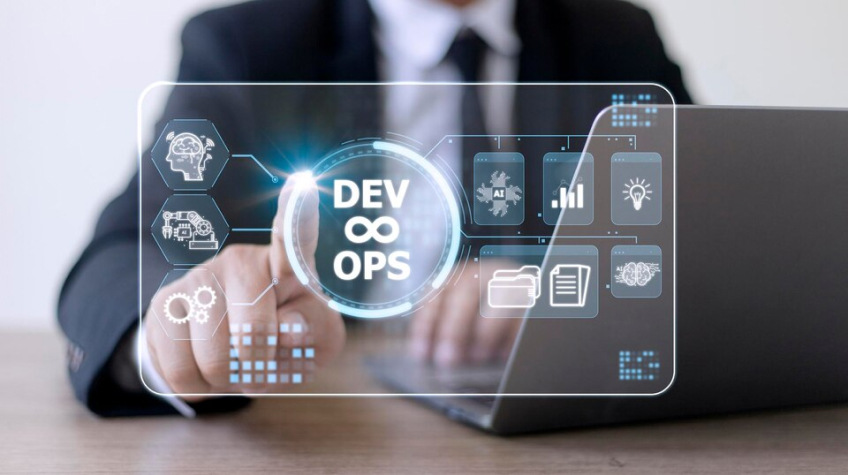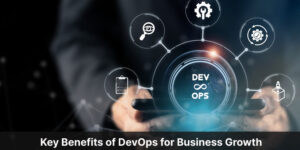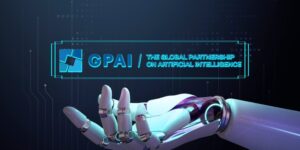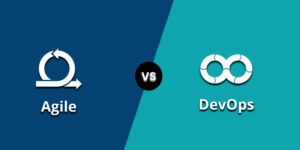
Welcome to the realm where technology and human ingenuity converge, where DevOps embraces the transformative power of Artificial Intelligence (AI). As software development and operations intertwine, AI emerges as a guiding light, illuminating the path toward greater efficiency, reliability, and collaboration.
With AI’s automation, intelligent insights, and predictive capabilities, DevOps transcends the confines of traditional methodologies. Yet, amidst this digital revolution, it’s crucial to remember the human touch, the essence of teamwork, and ethical considerations. Together, let’s explore how DevOps harnesses the extraordinary potential of AI, shaping a future where technology amplifies human brilliance and fuels innovation. This blog explores the path of how DevOps take advantage of AI.
What is DevOps?
DevOps is like a symphony, blending the worlds of software development and operations into harmonious collaboration. It’s a mindset that values seamless teamwork, efficiency, and continuous improvement. At its core, DevOps aims to bridge the gap between developers and operations teams, fostering a culture of shared responsibility and innovation.
It embraces agile practices, automation, and iterative methods to improve software quality and speed. DevOps thrives on open communication, breaking down silos, and fostering teamwork. DevOps serves as a catalyst in this dynamic landscape, empowering organizations to adapt, evolve, and embrace the ever-changing demands of the digital era.
What is AI?
AI, or Artificial Intelligence, is like a marvel of human ingenuity brought to life. It represents the quest to create technology that can mimic human intelligence and perform tasks that require human abilities. AI encompasses various technologies, from machine learning and natural language processing to computer vision and robotics.
Machines can analyze huge amounts of data, learn from patterns, and make informed decisions; thanks to it, AI has immense potential for revolutionizing the healthcare, finance, and transportation industries. It’s a fascinating field that constantly pushes the boundaries of what machines can achieve, inspiring awe and wonder in our quest for knowledge and innovation.
How AI is Transforming DevOps
In the ever-evolving software development landscape, a revolution is underway as Artificial Intelligence (AI) lends its transformative touch to DevOps. With AI as its ally, DevOps transcends the boundaries of traditional practices, propelling teams toward unprecedented efficiency and collaboration. Through AI’s intelligent automation, data-driven insights, and predictive analytics, DevOps practitioners can embark on a journey of innovation, unleashing their creative potential while delivering exceptional software solutions.
Yet, amidst this technological marvel, it is vital to remember the human touch—the collective wisdom, empathy, and collaboration that shape the very essence of DevOps. Together, we navigate this evolving landscape, forging a future where AI and human brilliance intertwine to reshape the world of software development.
What are the advantages of AI in DevOps?
The infusion of AI into the world of DevOps heralds a transformative era where technology and human ingenuity converge for remarkable results. AI’s benevolent influence enhances DevOps in numerous ways, instilling a human touch throughout the software development journey. By automating menial tasks, AI liberates teams to focus on creative brainstorming and collaboration.
Its data-driven insights enable proactive decision-making, empowering teams to optimize processes and deliver exceptional software solutions. With AI’s assistance, incident management becomes more efficient and empathetic as issues are swiftly detected and resolved, ensuring a seamless user experience. AI and DevOps forge a harmonious partnership where human potential flourishes and innovation thrives.
How to Implement AI in DevOps
Embarking on the exciting journey of implementing AI in DevOps requires a human touch, blending technology with empathy and collaboration. Start by fostering a shared vision among teams, highlighting the potential of AI to revolutionize their work. Encourage open discussions, allowing everyone to contribute their unique insights and concerns. Embrace a people-centric approach, providing training and resources to upskill and empower team members in AI concepts.
Establish ethical guidelines to ensure AI algorithms are fair, transparent, and inclusive. Embrace a gradual adoption, allowing space for experimentation, learning, and adaptation. Remember, it is through collective efforts and human touch that AI integration in DevOps can unlock innovation and create a brighter future.
Here are a few methods in which DevOps can leverage AI
1. Automation
AI-powered automation is akin to a reliable assistant, freeing DevOps teams from the burden of mundane and repetitive tasks. By seamlessly automating build processes, test execution, deployment, and monitoring, AI liberates human potential for more creative endeavors. It acts as a diligent teammate, tirelessly working in the background, enhancing efficiency, and expediting software delivery.
AI’s keen eye for detail minimizes errors, ensuring robust and reliable software solutions. The cumulative effect is a transformative boost in productivity, allowing teams to focus on strategic decision-making, innovation, and delivering exceptional experiences to end-users. AI empowers DevOps to achieve remarkable feats through this symbiotic partnership while fostering a human-centric approach to software development.
2. Continuous Integration and Continuous Deployment (CI/CD)
In the dynamic world of software development, AI emerges as a trusted ally in optimizing the CI/CD pipeline. AI brings intelligent insights and recommendations like a knowledgeable advisor, revolutionizing software delivery. Through code analysis, AI algorithms meticulously scrutinize quality, flag vulnerabilities, and propose enhancements to fortify the codebase.
With its predictive analytics prowess, AI guides DevOps teams in optimizing release cycles and deployment strategies, striking the delicate balance between speed and stability. This harmonious partnership with AI ushers in a new era of efficiency and confidence, where software delivery becomes a well-orchestrated symphony of precision and innovation.
3. Intelligent Testing
AI emerges as a game-changer in software testing, revolutionizing how DevOps approaches quality assurance. With cutting-edge techniques like machine learning and natural language processing, AI brings a new level of intelligence to testing. Like a diligent companion, AI can automatically generate test cases, intelligently detect anomalies, and uncover hidden patterns within testing data.
This infusion of AI augments tests coverage, ensuring comprehensive scrutiny while increasing accuracy and reducing the time and effort invested in testing. By leveraging the power of AI, DevOps teams embark on a journey towards more efficient, effective, and impactful testing practices, resulting in robust and high-quality software solutions.
4. Monitoring and Analytics
In monitoring and analytics, AI is an astute observer equipped to analyze vast operational data streams in real-time. With its machine learning algorithms, AI empowers DevOps teams to swiftly detect anomalies, identify performance bottlenecks, and predict potential system failures before they occur.
This proactive approach to monitoring enables teams to address issues quickly and ensure optimal system reliability. By harnessing the power of AI-driven analytics, DevOps practitioners gain valuable insights, enabling them to navigate the intricate complexities of their systems with greater efficiency, agility, and peace of mind.
5. Incident Management
In incident management, AI emerges as a dependable ally that analyzes historical data, log files, and system metrics. Like a seasoned detective, AI algorithms delve deep into the intricacies of incidents, identifying patterns and uncovering root causes. This intelligent analysis aids in incident detection, classification, and resolution, providing valuable insights and suggesting appropriate remediation actions.
By swiftly and accurately pinpointing the underlying issues, AI minimizes downtime, improves incident response, and helps teams restore normalcy efficiently. This collaborative partnership between AI and DevOps fosters a reliable safety net, ensuring systems remain robust and resilient despite unexpected challenges.
6. Capacity Planning
In capacity planning, AI is a visionary strategist, aiding DevOps teams in optimizing resource allocation. AI algorithms provide invaluable insights into future demand by analyzing historical usage patterns and leveraging predictive capabilities. This foresight enables teams to dynamically scale infrastructure resources, ensuring optimal utilization and cost efficiency.
With AI as their guide, DevOps practitioners can make informed decisions, proactively adapting their systems to meet evolving requirements. The result is improved system performance, seamless scalability, and the ability to align resources precisely with demand, empowering organizations to navigate the ever-changing landscape of technology with confidence and agility.
7. ChatOps
In collaboration, ChatOps emerges as a trusted ally, enhanced by the power of AI. With AI-powered chatbots at the helm, DevOps teams experience a seamless flow of communication and information. These intelligent chatbots serve as virtual assistants, offering real-time updates, automating routine inquiries, and providing valuable insights.
ChatOps platforms foster faster information sharing by streamlining communication channels, enabling teams to collaborate more effectively. With the assistance of AI, troubleshooting becomes more efficient as chatbots offer guided assistance and suggestions. This convergence of AI and ChatOps cultivates an environment of enhanced productivity, where teams can focus on innovation, problem-solving, and delivering exceptional results.
8. Considerations and Challenges
Addressing specific issues and challenges is crucial as AI increasingly integrates into DevOps. First and foremost, ethical considerations should guide AI usage, ensuring that algorithms and models adhere to ethical standards and respect privacy rights. Transparency and accountability are vital in promoting trust and responsible AI deployment. Further, addressing biases is essential to prevent unintended bias.
DevOps teams must actively work to mitigate biases in AI systems, considering diverse perspectives and implementing fairness measures. Moreover, human oversight remains critical. While AI can automate tasks, human decision-making and judgment should always be involved to ensure ethical and responsible outcomes. Striking the right balance between AI’s capabilities and human wisdom is pivotal for effectively leveraging AI’s potential in DevOps.
In conclusion, the union of DevOps and AI opens up possibilities where technology and human expertise intertwine. By harnessing the power of AI, DevOps teams gain a competitive edge, unlocking increased efficiency, improved collaboration, and accelerated innovation. AI’s intelligent automation streamlines processes, reducing errors and freeing time for creativity. Its data-driven insights empower teams to make informed decisions, optimize systems, and enhance user experiences.
Yet, in spite of this technological advancement, it remains important to remember that the human touch remains essential. DevOps thrives on collaboration, empathy, and ethical considerations, ensuring that AI augments our capabilities while preserving our core values. Together, DevOps and AI embark on a transformative journey, shaping a future where technology and human brilliance unite to achieve remarkable outcomes. We hope this information on how DevOps take advantage of AI is helpful to the readers.






